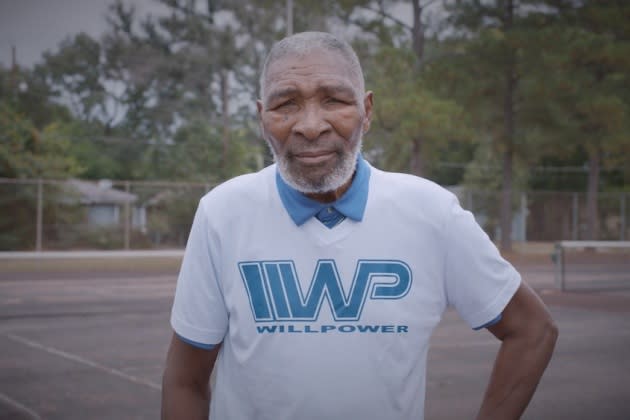‘On the Line: The Richard Williams Story’ Review: Venus and Serena’s Father Has His Say
- Oops!Something went wrong.Please try again later.
- Oops!Something went wrong.Please try again later.
- Oops!Something went wrong.Please try again later.

The poster for the documentary “On the Line: The Richard Williams Story” is cleverly acerbic. Against a white background stands one of the more derided — and more recently celebrated, via last year’s sports biopic, “King Richard” — figures in professional sports: Venus and Serena Williams’ father, Richard. He’s got a tennis racket in his hand and is clad in throwback tennis whites. It was not typically what he wore as he and wife Oracene (Price) trained their daughters on the public courts of Compton, Los Angeles. But the look was de rigueur for the white tennis establishment that Venus and Serena took on and then transformed.
In “On the Line,” Williams has his say. Unsurprisingly, he’s frank, occasionally funny, but also vulnerable, not least because he’s growing frail, having suffered from health issues. As directed by Stuart McClave, the documentary isn’t exactly a vanity project, but it does hew to Williams’ version of what in short order became (and continues to be) the history-making run of daughters Serena and Venus.
More from Variety
Some of what’s covered here will be familiar, like his love for Compton. He expresses gratitude to the gang members of the Crips who stood guard at the park where the girls practiced. He shares once again the vision of tennis stardom for his daughters, yet to be conceived, that occurred to him after he watched a match in which the winner won $40,000.
Most revealing here is his return to Cedar Grove, a suburb of Shreveport, La. The walking tour of the shack he grew up in underscores that classism and racism shaped both resentment and resilience. The film consults LSU sociology professor Dr. Kenna Franklin on the significance of Shreveport, segregation and the role of the Ku Klux Klan in the area. His reminiscences about his mother, Julia Mae Williams, who raised Richard and his four siblings on her own, and his father (who, says Williams “didn’t do a goddamn thing for me”) offer fresh appreciation into the man and his distinctive and very personal mission.
Asked why there wasn’t much mention of Arthur Ashe and Althea Gibson, McClave replied through the film’s publicist, “When I asked Mr. Williams specifically about Althea Gibson and Arthur Ashe, he felt a great respect for them but was clear in his view that he felt that they hadn’t transformed the sport of tennis the same way that someone like Jackie Robinson or Muhammad Ali had transformed their respective sport.” This may be true to Williams’ intent (the movie was produced by Williams’ son Chavoita LeSane and McClave), but expanded context, however quickly dispensed with, would have added much needed veracity to the historical record — a record Williams can correct but shouldn’t own.
Neither Serena, Venus nor Oracene Price have fresh interviews here. All their comments come from archival interviews or those home movies. Their absence doesn’t spoil the project — there’s plenty to learn — but it does pose questions about what’s unsaid. (And what’s with the documentary having the same title as Serena’s 2009 autobiography?) Left to share insights about Williams’ parenting is former Los Angeles city councilwoman Patricia Moore.
A Black sports psychologist would have been an interesting addition to the small if impressive roster of interviewees weighing in on the importance of Williams. The portrait would have become more nuanced on matters of parenting and competition not wholly defined by racism.
For insights into the tennis world, the director calls upon former United States Tennis Association president Katrina Adams (the first person of color and first female head of the organization) and Dr. Dale Caldwell, a tennis historian and founder of the Black Tennis Hall of Fame. Each does compelling work suggesting and then answering the question the white tennis world was collectively asking, “Who is this guy?” And Macci’s memories about Williams at the start of Venus and Serena’s careers are priceless, as is the reunion between these two men.
The Williams sisters (and their parents’ work as protectors and coaches) crucially changed the faces of tennis. Billie Jean King and Pam Shriver are illuminating on tennis during the initial period when the sisters arrived. Even so, several of their competitors’ opinions did not age well. Martina Navratilova, a maverick in her own right, said at the time that she didn’t think the women’s circuit struggled with issues of racism. Lindsey Davenport is quoted trying to not complain about the braided beads that came loose and slowed the match. But those interviews are as much a reflection of media obsessions with controversy and its own unexamined biases.
“On the Line” does a good job interrogating the media and commentators, mostly by showing just how awful they often were. The announcer for the infamous 2001 Indian Wells match — where Venus and Serena were set to play each other in the semifinal when Venus pulled out — is an exception. The animosity Venus and Richard faced when they entered the stadium and headed for their seats for the final were damning for a supposedly genteel sport. He calls out the boos and catcalling as racially biased.
Richard Williams is even more forthright about what he heard that day. Not one for the more euphemistic “the N-word,” Williams repeats the slur. And “On the Line” offers a portrait in which that frankness is deeply true to the man.
Best of Variety
Sign up for Variety’s Newsletter. For the latest news, follow us on Facebook, Twitter, and Instagram.
